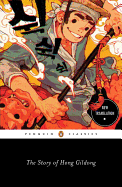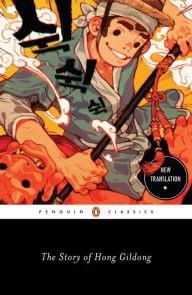
 Whether The Story of Hong Gildong is the oldest extant Korean prose fiction or the second oldest, whether it was written by poet and statesman Heo Gyun (1569-1618) about a real bandit or whether it's popular fiction by an anonymous commoner in the second half of the 19th century matters greatly to some. Not so much to the lucky English-language reader who comes upon Minsoo Kang's exciting new translation of this ancient story, now available from Penguin Classics.
Whether The Story of Hong Gildong is the oldest extant Korean prose fiction or the second oldest, whether it was written by poet and statesman Heo Gyun (1569-1618) about a real bandit or whether it's popular fiction by an anonymous commoner in the second half of the 19th century matters greatly to some. Not so much to the lucky English-language reader who comes upon Minsoo Kang's exciting new translation of this ancient story, now available from Penguin Classics.
Of 34 manuscripts, 25 of them handwritten, Kang has chosen the longest and oldest version of the work. About the length of The Epic of Gilgamesh, this little 77-page classic of the pre-Korean Kingdom of Joseon is the account of a high minister's son who, because he is born of his father's concubine, is "not allowed to address [his] own father as Father and [his] older brother as Brother." This is the famous, often-quoted lament for which Gildong is known in Korean culture. The sons of secondary wives had access to wealth and education, but no legal standing in society and were not accorded the rights of nobility.
The narrative consists of three parts of almost equal length. The first section, recounting Gildong's birth and youth in the compound of the Hong family, is a realistic portrayal of life in a nobleman's household. The second part of the narrative follows Gildong as he leaves his royal family to prove himself a superb leader of an outlaw gang that plunders from the rich. The third part concludes with his exploits on the islands of Jae and Yul, the establishing of his own kingdom and his reconciliation with the King of Joseon.
The fast-paced, plot-driven narrative is fueled by scenes of exciting action (like an assassination attempt) alternating with scenes of high emotion (like the deaths of his parents). The tale follows the over-achieving son of the concubine through rejecting the unfairness of his treatment and into his pursuit of excellence in kingship. As Korea has been historically conquered and colonized, Gildong's recovery of dignity and respect has a national echo that has made it persistently popular. As a secondary son who is "disrespected, unappreciated and underrated," attempting to overcome the disadvantages of his birth to prove his true worth as a leader of his people, Hong Gildong is the embodiment of an oppressed and underestimated Korea. --Nick DiMartino, Nick's Picks, University Book Store, Seattle, Wash.
Shelf Talker: In the first full-length translation of one of the oldest Korean novels, a frustrated secondary son deprived of a nobleman's rights becomes the leader of a band of outlaws.

